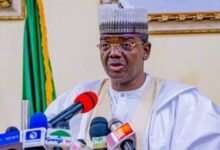
The President of the Petroleum and Natural Gas Senior Staff Association of Nigeria (PENGASSAN), Festus Osifo, has criticised oil marketers for exploiting Nigerians through inflated fuel prices, insisting that petrol should sell between ₦700 and ₦750 per litre.
This comes after depots across Nigeria have increased the pump prices of Premium Motor Spirit (PMS) following a surge in global crude oil prices triggered by rising tensions in the Middle East. A parallel strike by tanker drivers along Lagos’ Lekki-Epe corridor has further compounded the situation.
Data from Petroleumprice.ng revealed that Dangote Petroleum Refinery raised its petrol price from ₦825 to ₦840 on Monday, while Rainoil increased its price from ₦850 to ₦900. Fynefield and Mainland adjusted their ex-depot prices to ₦930 and ₦920, respectively, marking increases of ₦51 and ₦63. Other reported prices included Sigmund at ₦920, Matrix Warri at ₦910, NIPCO at ₦895 (up from ₦827), and Aiteo at ₦840.
The rise in ex-depot prices suggests that petrol could approach ₦1,000 per litre in the coming days.
Clement Isong, Executive Secretary of the Major Energies Marketers Association of Nigeria (MEMAN), attributed the spike to rising crude prices. However, a depot operator who spoke anonymously said Monday’s halt in petrol loading—caused by tanker drivers’ protest over a ₦12,500 E-Call-Up fee—was a more immediate concern.
“If unresolved, this E-Call-Up issue could plunge the country into another fuel scarcity,” the operator warned.
Meanwhile, Nigeria’s crude grades—Bonny Light, Brass River, and Qua Iboe—climbed to $77 per barrel on Friday, continuing the upward trend into Monday due to Israel’s military actions against Iran. As of Monday, Bonny Light stood at $78.62 per barrel, according to Oilprice.com. These prices now exceed the Federal Government’s 2025 budget benchmark of $75, offering temporary fiscal relief but threatening domestic fuel stability.
Energy experts caution that higher crude prices will raise the cost of refined products like petrol and diesel, due to the rising cost of feedstock.
On the E-Call-Up crisis, MEMAN’s Isong urged the Lagos State Government to engage stakeholders and resolve the issue quickly to prevent further disruptions. He echoed tanker drivers’ concerns that the ₦12,500 levy could spark additional fuel price hikes, noting that Nigerians are already under financial pressure.
At a press conference in Abuja, PENGASSAN President Festus Osifo claimed that the persistent shutdowns of Nigeria’s state-owned refineries are politically motivated rather than due to technical faults.
Despite over $2.5 billion invested in refinery rehabilitation, he lamented that facilities like the Port Harcourt Refinery remain largely unproductive. The facility is currently undergoing a 30-day maintenance shutdown and is expected back online next week.
“We are aware the Port Harcourt Refinery was recently shut for maintenance, but the deeper issue is that these refineries operate far below efficiency. Political interference, not just technical issues, has stalled their performance,” Osifo said.
He urged the Nigerian National Petroleum Company Limited (NNPCL) to revisit its refinery operations model and adopt long-standing recommendations from PENGASSAN, which has been advocating reforms for over 15 years.
On the disparity in fuel pricing, Osifo criticised the continued high cost of PMS despite falling global crude oil prices. “Crude has dropped from about $80 to between $62 and $65 per barrel, yet petrol still sells at ₦875 to ₦905 per litre nationwide,” he said.
He blamed the Nigerian Midstream and Downstream Petroleum Regulatory Authority (NMDPRA) for failing to enforce fair pricing under the deregulated market system.
“NMDPRA must not allow marketers to exploit Nigerians under the guise of deregulation,” Osifo stated. “Crude price and exchange rate account for nearly 80% of the final retail price. With current international benchmarks, petrol should retail between ₦700 and ₦750 per litre.”
He urged the agency to start publishing transparent pricing templates to prevent arbitrary pricing practices.
Osifo also expressed concern over worsening insecurity in Nigeria’s oil-producing regions, particularly along the waterways. He warned that this is prompting multinational oil companies to divest, despite cost-saving incentives recently introduced by the Federal Government.




